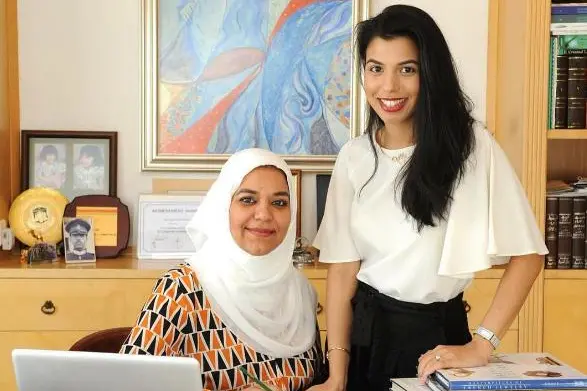PHOTO
Shadya Al Ismailiya has always been fascinated with making her own jewelry. While working a full-time job, she would always turn to her hobby during her spare time. But a 20-year career in the finance and investment industry failed to give her the kind of satisfaction her craft provides, and so Deema was born in 2008.
"I felt that my work was not fulfilling my aspirations. I thought I'd give it a few years, and maybe things would improve," said Al Ismailiya. "In the meantime, my daughter Suad and I started working on setting up our brand, Deema."
The Muscat-based fine jewelry brand's collection immediately received the thumbs up from both fashionistas and jewelry aficionados, who were looking for elegant Omani-inspired pieces, with a modern twist.
Al Ismailiya kept her day job while nurturing her young start-up. After three years, she quit her job - and the steady income that goes with it - so she can focus on what she is most passionate about.
She developed her skills by enrolling in formal professional jewelry designing courses at the Birmingham School of Jewellery at the Birmingham City University in the United Kingdom. Her daughter Suad, a lawyer at an international firm, eventually also resigned her position to concentrate on the business.
"Three years passed and I still wasn't happy with my work. My passion for designing got even stronger, and in fact, I had become obsessed with it," Al Ismailiya admitted.
Inspired by tradition
What started as a personal interest in jewelry-making nearly eight years ago has now become one of Oman's most popular high-end brands.
Deema has also expanded its product line beyond jewelry, to include the design and manufacturing of luxury goods like chinaware, linen and ornaments.
Omani heritage is a source of inspiration in Deema's designs. The mother-daughter duo often turns to local tradition, culture, and Islamic art and design to create unique and modern range of jewelry.
Through their designs, the entrepreneurs also hoped to raise Omani jewelry's appeal to consumers.
"I started Deema Oman firstly, because many Omani women refrained from wearing their jewelry because it was impractical," said Al Ismailiya. She went on to explain that traditional Omani jewelry are often heavy, chunky and not ideal for everyday wear. As a result, they are worn only during special social events like weddings and in most cases, confined in storage boxes.
"So in part, our goal was to preserve our heritage and keep it alive. I felt it was my patriotic duty, to primarily encourage the modern Omani women to appreciate and embrace traditional designs," Al Ismailiya added.
Haute couture jewelry
Deema focuses on a niche segment of the jewelry market, preferring to cater to clients looking for pieces with exclusive and unique designs, and high quality. Both Al Ismailiya and her daughter are committed to blending traditional designs with the latest international jewelry trends.
As a start-up, Deema faced a number of challenges, both regarding the industry and market. The brand has struggled to acquire various materials, including expensive, but nonetheless unique, stones. The designers have also found it difficult to source local skilled workers and workshops that could manufacture their jewelry.
"The jewellery-making industry in our region, in my opinion, is still premature," said Al Ismailiya.
Reflecting on what has transpired over the past eight years, Al Ismailiya had no regrets and would happily go through the same experience all over again, as it helped her become the kind of entrepreneur that she is now.
"I would not have hesitated to choose this path. In fact, I would have chosen to start even earlier. Entrepreneurship is challenging, exciting and rewarding at the same time," she said. "Since I worked in both public and private sectors, I must say that achieving one's aspirations in any field is impossible without a clear vision, proper research and a comprehensive plan."
© Accelerate SME 2016





















